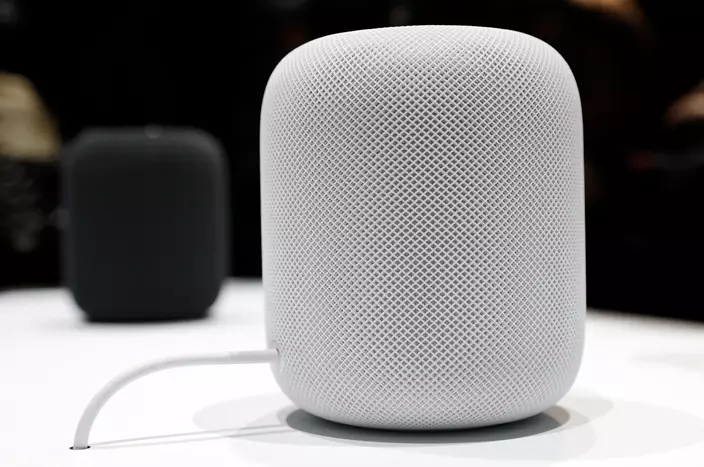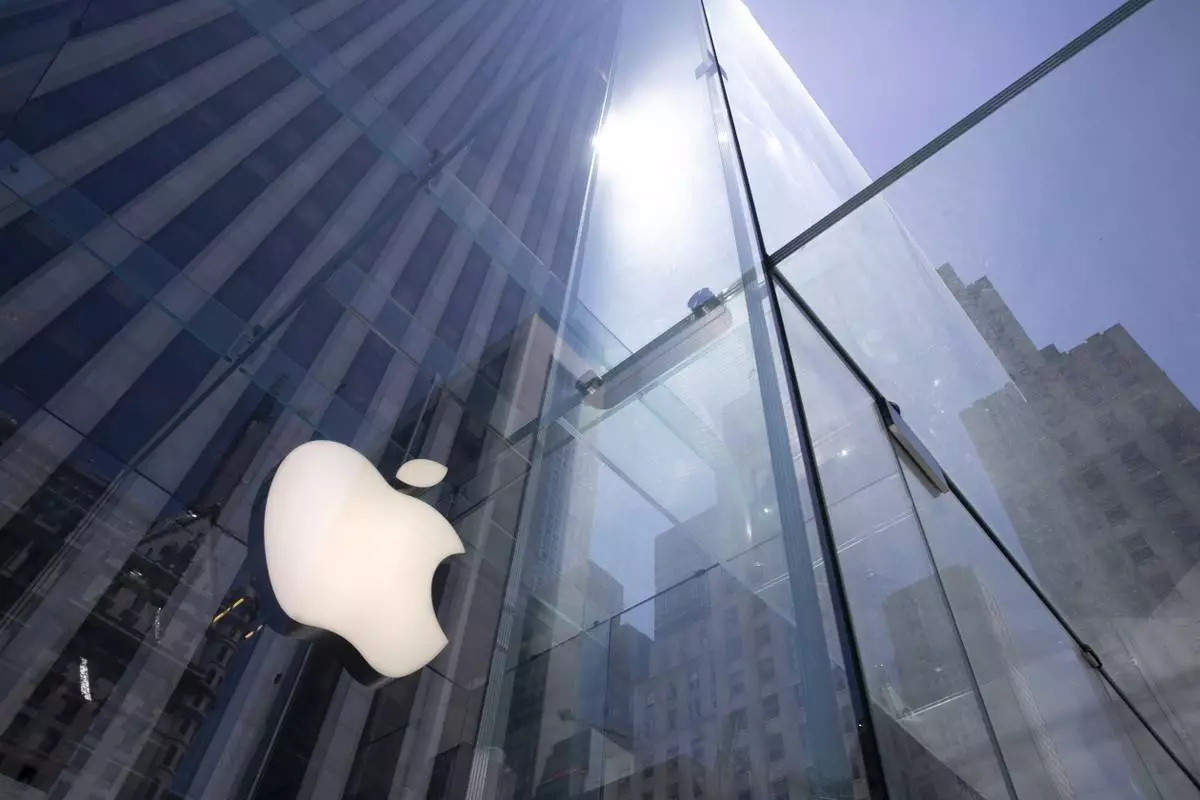Apple's new internet-connected speaker is proving to be more appealing to the ears than to the eyes, depending on where the device is placed.
Some people who bought the just-released $349 speaker, dubbed the HomePod, are reporting that it leaves a white ring on the surfaces of wooden furniture.

This June 5, 2017, file photo shows the HomePod speaker in a showroom during an announcement of new products at the Apple Worldwide Developers Conference in San Jose, Calif. (AP Photo/Marcio Jose Sanchez, File)
In an explanation posted Wednesday, Apple said the problem occurs with speakers that, like the HomePod, are equipped with a silicon base to minimize vibration. The company said the marks will often "go away" after a few days if you move the speaker somewhere else.
If they don't, it recommends wiping wood tarnished by the HomePod with a soft or damp cloth, or cleaning the surface "with the furniture manufacturer's recommended cleaning process."
The marks left by the HomePod threaten to stain Apple's reputation for designing iPhones, iPads and Mac computers that are frequently prized as much for how they look as for how they work. Though it's still too early to tell whether the HomePod's blemishes on wood will dampen the device's sales. If so, that could hamper Apple's efforts to catch up to less expensive internet-connected speakers from Amazon and Google that had a head start in the still nascent market.
Both Amazon and Google designed their speakers primarily to serve as digital hubs that manage peoples' homes and lives via voice-activated assistants. Apple, by contrast, is marketing the HomePod as a high-fidelity speaker programmed to learn listeners' tastes and automatically select songs from the company's music-streaming library.
In the process, Apple hopes to build upon its 36 million Apple Music subscribers and to establish a toehold in people's homes that will give it more opportunities to peddle its services. The HomePod also features Apple's assistant Siri, which is still catching up to Amazon's Alexa and Google's eponymous Assistant in responsiveness and versatility.
Apple on Thursday disclosed its steepest quarterly decline in iPhone sales since the pandemic’s outset, deepening a slump that’s increasing the pressure on the trendsetting company to spruce up its products with more artificial intelligence.
The 10% drop in year-over-year iPhone sales for the January-March period is latest sign of weakness in a product that generates most of Apple’s revenue. It marked the biggest drop in iPhone sales since July-September period in 2020, when production bottlenecks caused by factory closures during the pandemic resulted in a delayed release of that year's model.
The current iPhone downturn was the main reason Apple’s revenue for the latest quarter decreased 4% from last year to $90.8 billion. It marked the fifth consecutive quarter that Apple’s revenue dipped from the previous year. Apple’s profit in the past quarter totaled $23.64 billion, or $1.53 per share, a 2% dip from last year.
But both Apple's revenue and earnings per share came in slightly above analysts projections, according to FactSet Research. Apple also predicted its revenue for the April-June quarter will rise modestly from a year ago, which would end the recent streak of erosion.
Part of the iPhone deterioration during the first three months of the year stemmed from a big boost in sales during the same period last year when Apple said it was filling pent-up demand caused by pandemic-driven shipment delays.
Even as it stumbles slightly, Apple remains one of the world’s most prosperous companies. The Cupertino, California, company hammered home that point by announcing a 4% increase in its quarterly dividend to 25 cents per share. The company also committed to spending $110 billion buying back its own stock, a move that investors cheered but may fuel criticism that Apple is spending more money catering to Wall Street than creating more innovative products.
Bolstered by the increased dividend and stock repurchase commitment, Apple's shares rose nearly 7% in extended trading after the news came out. The stock price has fallen 10% so far this year, erasing about $300 billion in stockholder wealth.
Although investors have been dismayed by the weakening iPhone sales, they are also concerned Apple may be losing its edge as other tech giants such as Microsoft and Google sprint out to the early lead in artificial intelligence technology that is expected to reshape the industry and technology.
The latest quarterly report “leaves no margin for doubt about Apple’s current state of affairs,” said Investing.com analyst Thomas Monteiro. “More than ever in the past decade, the company needs new products and solutions.”
Apple is widely expected to unveil more AI services in June during an annual conference showcasing the next version of its software for the iPhone and Mac computers.
“We believe in the transformative power and promise of AI and we believe we have advantages that will differentiate us in this new era,” Apple CEO Tim Cook assured analysts during a Thursday conference while promising more details will be announced soon.
Weak sales in China were again a factor in the latest quarter, with revenue in that region falling 8% from last year to $16.37 billion as rival smartphone makers gained ground in one of the company’s largest markets. Even so, analysts had been anticipating an even bigger sales decline in the results, providing investors with a measure of relief.
Apple had a few bright spots in the past quarter too, most notably in its service division, which saw its revenue rise 14% from the year before to $23.87 billion.
The division reaps a significant portion of its revenue from a lucrative deal that locks in Google as the search engine that automatically answers queries on the iPhone — an arrangement that is a focal point of an antitrust trial currently wrapping up with closing arguments in Washington this week.
Commissions collected on digital transactions within iPhone apps are also a major revenue source within Apple’s services division, an area being targeted in a U.S. Justice Department lawsuit alleging the company is running an illegal monopoly that locks out competition to the detriment of consumers.
That case is expected to take several years to resolve, but European regulators already are forcing Apple to allow more alternatives to its proprietary iPhone app store as part of the Digital Markets Act.

FILE - In this June 16, 2020 file photo, the sun is reflected on Apple's Fifth Avenue store in New York. Apple will reports earnings on Thursday May 2, 2024. (AP Photo/Mark Lennihan, File)











